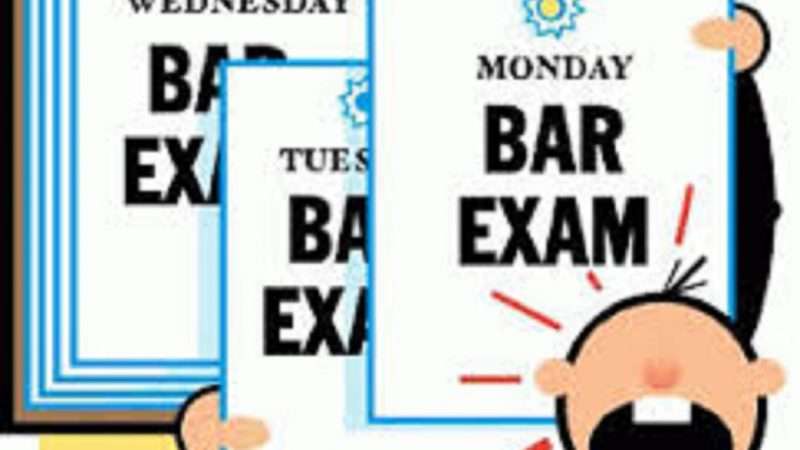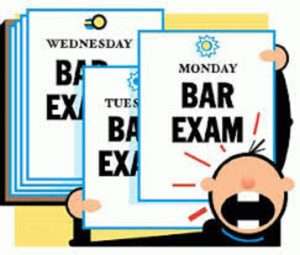From Judge Michael Baylson (E.D. Pa.), issued last week: If any attorney for a party, or a pro se party, has used Artificial Intelligence (“AI”) in the preparation of any complaint, answer, motion, brief, or other paper, filed with the Court, and assigned to Judge Michael M. Baylson, MUST, in a clear and plain factual…


An important new study by Washington University (St. Louis) legal scholar Kyle Rozema finds that bar exam requirements massively reduce the number of lawyers. While some might cheer that result, the main effect is to increase the cost and reduce the availability of legal services. Lack of access to affordable legal representation is a serious problem in our legal system, particularly for the poor and lower middle class.
The ABA Journal has a helpful summary of several of Rozema’s key findings:
If jurisdictions eliminate the bar exam as an entry to attorney licensure, the labor supply of lawyers would increase by 16%, according to new research by Kyle Rozema, an associate professor at the Washington University School of Law in St. Louis…..
Additionally, Rozema found that the labor supply of lawyers would increase by 8% if states adopt the most lenient bar exam policies and would decrease by 14% if the strictest policies are adopted….
Rozema also examined the time period between taking a bar exam, getting the results and being admitted to practice law. The average lawyer can get a law license five months after graduation, according to the working paper, which is posted on SSRN.
“Although this lag may seem like a temporary delay to recent law school graduates, the fact that it happens each year to subsequent cohorts means that changes to policies that eliminate the lag can increase labor supply by as much as 3%,” Rozema wrote.
The 16% figure is an imperfect estimate, and Rozema notes a number of factors it doesn’t consider. But even if the true reduction in the number of lawyers caused by bar exam requirements is “only,” say, 10%, it’s still a big effect.
Many people dislike lawyers and believe there are too many of them. If you hold that view, you might conclude that Rozema’s findings are cause for celebration! Things could be even better if state governments made bar exams more onerous, thereby reducing the number of lawyers even more.
But restricting the number of lawyers makes their services more expensive, reducing competition in the legal profession. This makes it difficult or impossible for many lower-income people get access to legal services—a problem that has been long been highlighted by economists, legal scholars, and activists. It’s a rare point of agreement between conservative Supreme Court Justice Neil Gorsuch and liberal Sonia Sotomayor. (though I am not a fan of her proposed solution to the problem).
The reduction in competition might be worth it if bar exams tested skills that practitioners must have in order to be effective lawyers. In reality, however, bar exams are largely a test of your ability to memorize thousands of arcane rules, the vast majority of which most practitioners don’t actually use. As co-blogger Orin Kerr puts it, “when [the bar exam] is over you can forget everything you just learned.” The reason you can do that is you are unlikely to ever use that knowledge again!
Essentially, bar exams screen out large numbers of people whose memorization skills aren’t good enough to remember a vast number of rules. Yet many people with relatively weak memorization skills can still be competent lawyers—especially in an age where it is relatively easy to look up details in electronic databases.
The main beneficiaries of bar exams are not consumers of legal services, but already licensed lawyers. The exams reduce the amount of competition we face!
For this reason, I have long been an advocate of abolishing bar exams, even though it may not be in my self-interest to hold that view. More recently, such luminaries as Yale Law School Prof. Stephen Carter have joined the “ban the bar exam” bandwagon (I commented on his critique here). As I have pointed out in previous writings on this topic, abolishing the bar exam wouldn’t deprive consumers of all indicators of a lawyer’s competence (or lack thereof). The public could still rely on voluntary certification mechanisms, the lawyer’s track record, referrals from previous clients, and other factors.
And state bar associations could still offer bar exams if they wanted to. If passage really is an indicator of quality useful to consumers, lawyers would have an incentive to take the exams and advertise the fact they passed them. Making the exam optional would incentivize bar associations to revamp them in ways that make them better measures of competence.
For the record, I also advocate abolishing the requirement (in force in most states) that lawyers must graduate from an ABA-accredited law school; though Rozema finds that that requirement actually has much less impact in reducing the number of lawyers than the bar exam does (I am not sure his conclusion there is correct). Let law schools compete in the voluntary certification market!
But if abolition is too radical an approach for you to swallow, I take this opportunity to once again tee up my “modest proposal” for bar exam reform:
Members of bar exam boards… and presidents and other high officials of state bar associations should be required to take and pass the bar exam every year by getting the same passing score that they require of ordinary test takers. Any who fail to pass should be immediately dismissed from their positions…. And they should be barred from ever holding those positions again until… they take and pass the exam.
After all, if the bar exam covers material that any practicing lawyer should know, then surely the lawyers who lead the state bar and administer the bar exam system itself should be required to know it. If they don’t, how can they possibly be qualified for the offices they hold? Surely it’s no excuse to say that they knew it back when they themselves took the test, but have since forgotten….
Of course, few if any bar exam officials or state bar leaders could pass the bar exam without extensive additional study…. That’s because, as anyone who has taken a bar exam knows, they test knowledge of thousands of arcane legal rules that only a tiny minority of practicing lawyers ever use. This material isn’t on the exam because you can’t be a competent lawyer if you don’t know it. It’s there so as to make it more difficult to pass, thereby diminishing competition for current bar association members….
If bar exam board members and bar association leaders were required to take and pass the exam every year, they would have strong incentives to reduce the amount of petty trivia that is tested. After all, anything they include on the exam is something they themselves will have to memorize! As prominent practicing lawyers, however, they presumably are already familiar with those laws that are so basic that any attorney has to know them; by limiting the exam to those rules, they can minimize their own preparation time. In this way, the material tested on bar exams might be limited to the relatively narrow range of legal rules that the average practicing lawyer really does need to know.
Rozema’s study strengthens the case for the “modest proposal” and for other, more conventional, approaches to reducing the amount of material tested on bar exams.
The post Study Finds Bar Exam Requirements Greatly Reduce the Number of Lawyers appeared first on Reason.com.

















